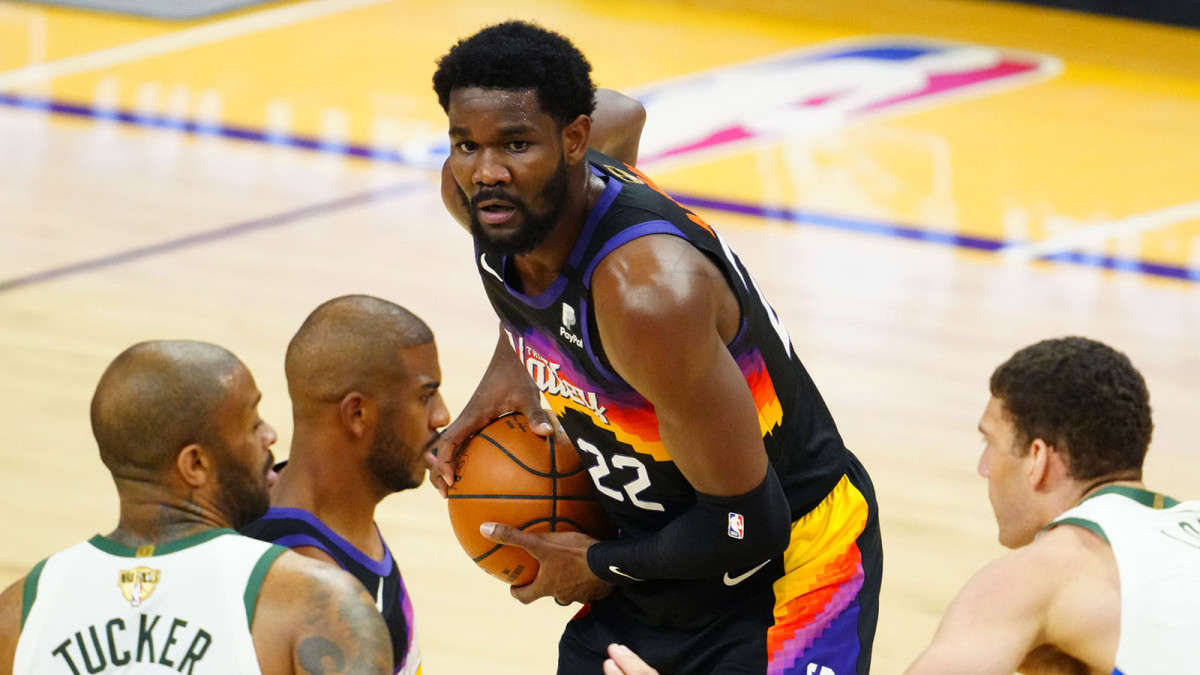Suns Should Not Burn a Bridge With Deandre Ayton

The Suns can’t afford to lose Deandre Ayton. Robert Sarver can afford to pay him. So what’s the holdup?
Phoenix and Ayton had been engaged in discussions this summer regarding an extension for the No. 1 pick from the 2018 draft, though those talks have reportedly “stalled,” according to ESPN. Ayton is asking for the full max extension received by other members of his class, including Trae Young and Luka Dončić (among others). The ESPN story also makes it clear which side is responsible for the holdup. The report states ownership, or Sarver in this case, is asserting Ayton shouldn’t be included in the group of max extensions. From the report:
“If Suns owner Robert Sarver doesn’t come to an agreement with Ayton before the deadline, it will certainly raise questions again about his commitment to constructing a sustainable contender in the Western Conference.”
After all the goodwill the Suns built last season, first by acquiring Chris Paul and then making a surprise run to the Finals, not agreeing to a deal with Ayton would be … silly? Phoenix wouldn’t necessarily risk losing Ayton in this scenario. The former Arizona star would become a restricted free agent next July if he doesn’t agree to a new deal, meaning the Suns can match any offer he signs. But why build any acrimony with one of your young stars immediately after he proved to be incredibly valuable during a championship chase, especially when the front office has a checkered history when it comes to this stuff?
Ayton was spectacular for Phoenix during the postseason. He increased his scoring average, rebound average and field goal percentage in the playoffs. Perhaps even more important, he proved after an up-and-down start to his career, he could not only stay on the court during high-leverage moments, he could thrive. Ayton was instrumental to the Suns’ success, affecting games with his energy on both ends of the floor and capably defending All-Star bigs such as Anthony Davis, Nikola Jokić and Giannis Antetokounmpo.
If there’s one slight hole in Ayton’s max case, it’s the talent he’s surrounded with. The big man isn’t a shot creator, and a lot of his offense depends on the brilliance of Paul and Devin Booker. It may be hard to imagine giving out superstar money in a capped league to someone who isn’t a natural 20-point scorer, but Ayton’s willingness to stick to his role should be lauded, not penalized. Ayton’s commitment to being a roll man and defensive disruptor maximizes the Suns, and it’s a role not every center can perform skillfully enough to stay on the floor in the last few minutes of a Finals game.
Get the Basketball Preview issue here
Sarver’s reputation, as well as his team’s future, could be at stake here. The Suns were not a well-regarded franchise before James Jones took over the front office. And penny-pinching when the team was just two games from an NBA title is doubly frustrating, particularly for fans who remember when the team let eventual All-Star Joe Johnson walk away from a budding contender in 2005, also for financial reasons.

Small markets can’t have it both ways. They can’t decry players who don’t want to sign with them in favor of the big cities, be upset when players ask out, but then not retain their talent at fair market value. Sarver has to pay up. This is the price of trying to win championships. It’s not just Ayton, it’s Mikal Bridges, too, another 2018 draftee who is extension-eligible, and is one of the league’s premier 3-and-D wings. Sarver should look at what the Nuggets have done, unflinchingly giving out contracts to Jokić, Jamal Murray, Michael Porter Jr. and Aaron Gordon as they try to lock in their title-chasing core. In the Suns’ case, what’s the point of acquiring all this talent if you don’t want to keep it together?
This is just bad business. There’s no need to sow distrust with Ayton. There’s no need to make agents and players around the league once again take note of your franchise for the wrong reasons. And it makes no sense not to want to lock in a core of Ayton, Booker and Bridges—three 20-something building blocks who could be a force in the West for the rest of this decade. (A quick look at the cap sheet would also let you know Phoenix has very little money committed beyond the next two seasons.)
This situation won’t necessarily end poorly. The extension deadline is not until Oct. 18. And in a worst-case scenario, the Suns can match any deals Ayton or Bridges signs next summer. Still, at a time when player-management relationships are perhaps more fragile than ever, why the Suns want to drag this out is a head-scratcher at best. If anything, Phoenix has a rare, golden opportunity to secure long-term commitments from players who can be the foundation of a championship roster. If Robert Sarver doesn’t want to pay for that, then he doesn’t want to win.
More NBA Coverage:
• Luka Dončić Is Learning From the Best
• Karl-Anthony Towns Opens Up About His Season of Grief
• Trae Young Is the Hawks' Torchbearer
• The Lakers Are Going All In
